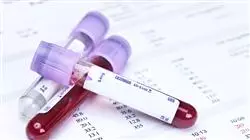University certificate
The world's largest faculty of medicine”
Introduction to the Program
Questo programma è la migliore opzione che si possa trovare per specializzarsi nel diabete"

Diabetes is a complex, chronic process that requires specific knowledge and skills for a comprehensive approach that goes beyond glycemic control.
This Postgraduate diploma in Diabetes Complications presents a global and complete vision of this disease that is useful for the proper management of patients with diabetes at any level of care.
This is a unique and innovative training program, based on an up-to-date description of the epidemiological situation of diabetes. This Postgraduate diploma delves into the complex pathophysiology of the disease, in the comprehensive evaluation of its acute and chronic complications, from a specialized point of view, and in its integral treatment.
Its contents cover the most innovative aspects of diabetes, such as the implementation of technology to control and treat this disease, and the most innovative areas in the research of new therapeutic approaches. All this, without forgetting the crucial role of diabetes education for the control of the disease.
This program is unique in that it includes a broad view of the disease across all patient ages and special situations. It also delves into the social aspects of diabetic patients' lives that require specific knowledge so that they can be addressed.
A quality training with which you will be able to stand out in a highly competitive sector and improve your skills and knowledge in the field.
Improve the quality of care for your patients with this innovative diabetes educational program"
Questo Postgraduate diploma in Diabetes Complications possiede il programma educativo più completo e aggiornato del mercato. Le caratteristiche principali del corso sono:
- Practical cases presented by experts in Diabetes
- The graphic, schematic, and practical contents with which they are created, provide scientific and practical information on the disciplines that are essential for professional practice
- New developments in Diabetes
- Practical exercises where the self-assessment process can be carried out to improve learning
- Special emphasis on innovative methodologies in Diabetes
- Theoretical lessons, questions to the expert, debate forums on controversial topics, and individual reflection work
- Content that is accessible from any fixed or portable device with an internet connection
Questo Postgraduate diploma è il miglior investimento in un programma di aggiornamento per due motivi: oltre ad aggiornare le tue conoscenze in Diabete, otterrai una qualifica rilasciata da TECH Global University”
The teaching staff includes professionals from the field of Diabetes, who bring their experience to this training program, as well as renowned specialists from leading societies and prestigious universities.
Its multimedia content, developed with the latest educational technology, will provide the professional with situated and contextual learning, i.e., a simulated environment that will provide an immersion education programmed to learn in real situations.
This program is designed around Problem-Based Learning, whereby the professional must try to solve the different professional practice situations that arise throughout the program. For this purpose, the professional will be assisted by an innovative interactive video system created by renowned and experienced experts in Diabetes with extensive medical experience.
Take the step and join our team. You will find the best educational material to enhance your studies"

This 100% online Postgraduate diploma will allow you to balance your studies with your professional work while expanding your knowledge in this field"
Why study at TECH?
TECH is the world’s largest online university. With an impressive catalog of more than 14,000 university programs available in 11 languages, it is positioned as a leader in employability, with a 99% job placement rate. In addition, it relies on an enormous faculty of more than 6,000 professors of the highest international renown.

Study at the world's largest online university and guarantee your professional success. The future starts at TECH”
The world’s best online university according to FORBES
The prestigious Forbes magazine, specialized in business and finance, has highlighted TECH as “the world's best online university” This is what they have recently stated in an article in their digital edition in which they echo the success story of this institution, “thanks to the academic offer it provides, the selection of its teaching staff, and an innovative learning method aimed at educating the professionals of the future”
A revolutionary study method, a cutting-edge faculty and a practical focus: the key to TECH's success.
The most complete study plans on the university scene
TECH offers the most complete study plans on the university scene, with syllabuses that cover fundamental concepts and, at the same time, the main scientific advances in their specific scientific areas. In addition, these programs are continuously being updated to guarantee students the academic vanguard and the most in-demand professional skills. In this way, the university's qualifications provide its graduates with a significant advantage to propel their careers to success.
TECH offers the most comprehensive and intensive study plans on the current university scene.
A world-class teaching staff
TECH's teaching staff is made up of more than 6,000 professors with the highest international recognition. Professors, researchers and top executives of multinational companies, including Isaiah Covington, performance coach of the Boston Celtics; Magda Romanska, principal investigator at Harvard MetaLAB; Ignacio Wistumba, chairman of the department of translational molecular pathology at MD Anderson Cancer Center; and D.W. Pine, creative director of TIME magazine, among others.
Internationally renowned experts, specialized in different branches of Health, Technology, Communication and Business, form part of the TECH faculty.
A unique learning method
TECH is the first university to use Relearning in all its programs. It is the best online learning methodology, accredited with international teaching quality certifications, provided by prestigious educational agencies. In addition, this disruptive educational model is complemented with the “Case Method”, thereby setting up a unique online teaching strategy. Innovative teaching resources are also implemented, including detailed videos, infographics and interactive summaries.
TECH combines Relearning and the Case Method in all its university programs to guarantee excellent theoretical and practical learning, studying whenever and wherever you want.
The world's largest online university
TECH is the world’s largest online university. We are the largest educational institution, with the best and widest online educational catalog, one hundred percent online and covering the vast majority of areas of knowledge. We offer a large selection of our own degrees and accredited online undergraduate and postgraduate degrees. In total, more than 14,000 university degrees, in eleven different languages, make us the largest educational largest in the world.
TECH has the world's most extensive catalog of academic and official programs, available in more than 11 languages.
Google Premier Partner
The American technology giant has awarded TECH the Google Google Premier Partner badge. This award, which is only available to 3% of the world's companies, highlights the efficient, flexible and tailored experience that this university provides to students. The recognition as a Google Premier Partner not only accredits the maximum rigor, performance and investment in TECH's digital infrastructures, but also places this university as one of the world's leading technology companies.
Google has positioned TECH in the top 3% of the world's most important technology companies by awarding it its Google Premier Partner badge.
The official online university of the NBA
TECH is the official online university of the NBA. Thanks to our agreement with the biggest league in basketball, we offer our students exclusive university programs, as well as a wide variety of educational resources focused on the business of the league and other areas of the sports industry. Each program is made up of a uniquely designed syllabus and features exceptional guest hosts: professionals with a distinguished sports background who will offer their expertise on the most relevant topics.
TECH has been selected by the NBA, the world's top basketball league, as its official online university.
The top-rated university by its students
Students have positioned TECH as the world's top-rated university on the main review websites, with a highest rating of 4.9 out of 5, obtained from more than 1,000 reviews. These results consolidate TECH as the benchmark university institution at an international level, reflecting the excellence and positive impact of its educational model.” reflecting the excellence and positive impact of its educational model.”
TECH is the world’s top-rated university by its students.
Leaders in employability
TECH has managed to become the leading university in employability. 99% of its students obtain jobs in the academic field they have studied, within one year of completing any of the university's programs. A similar number achieve immediate career enhancement. All this thanks to a study methodology that bases its effectiveness on the acquisition of practical skills, which are absolutely necessary for professional development.
99% of TECH graduates find a job within a year of completing their studies.
Postgraduate Diploma in Diabetes Complications
Diabetes is a chronic disease that affects the level of sugar in the blood and can cause serious health complications if not properly controlled. People with diabetes are at increased risk for cardiovascular disease, such as atherosclerosis, hypertension and coronary heart disease. These complications can increase the risk of heart attacks and strokes.
It is important to understand that these complications can be prevented or delayed by properly controlling blood sugar, blood pressure and blood cholesterol. Maintaining a healthy lifestyle and following medical guidelines is essential to prevent complications and improve the quality of life in people with diabetes.
Learn from other health experts in diabetes care
Get to know the basics of diabetes, how the disease develops and how it affects the body over the long term. This includes understanding the symptoms and function of the different types of insulin and other medications used in the treatment of diabetes.
Gain experience working directly with diabetic patients, this will allow you to better understand how diabetes manifests itself individually in each patient and how it affects their quality of life and overall health, complications of diabetes can affect multiple parts of the body, including the eyes, kidneys, feet and cardiovascular system. Learn about common complications and how they can be effectively prevented and treated.
Recognize and apply new technologies and products on the market to help people with diabetes manage the disease and its complications. Learn about the use of blood glucose sensors, insulinotractors, continuous insulin infusion systems and other products that have been created for diabetes care.
Specialize through our high-quality specialized program and become an expert in diabetes complications, learn first hand the latest understandings about diabetes and its complications.







